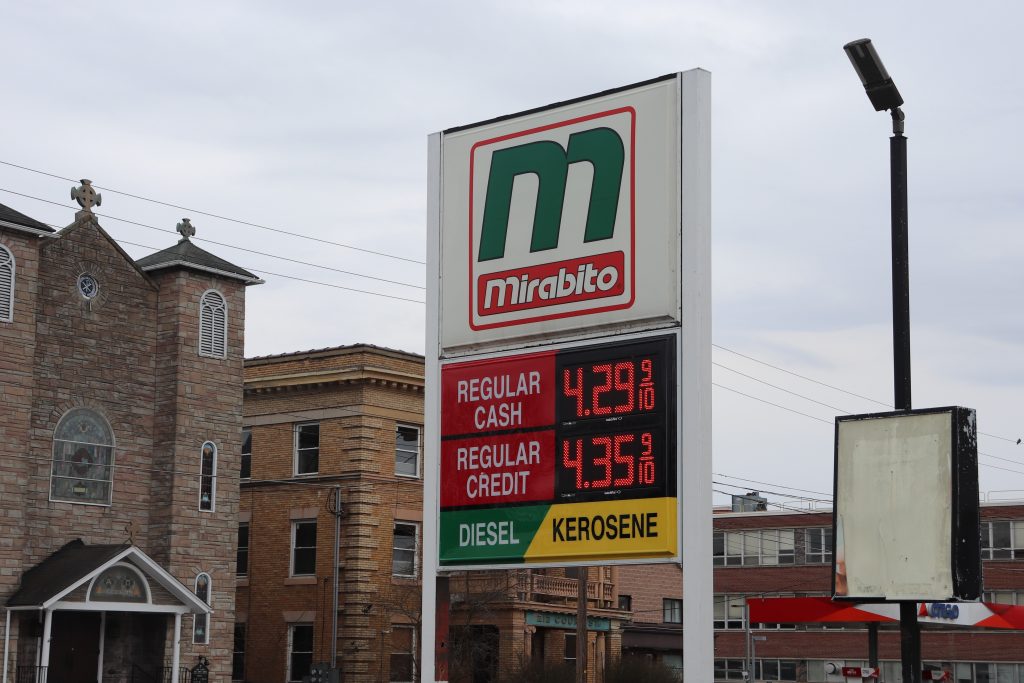People across the United States, including Binghamton University students, are finding themselves paying more at the gas pump.
According to the New York State Energy Research and Development Authority, the current average price for regular-grade gas in New York state is around $4.28, nearly a 16 percent increase from last month and a 51.1 percent increase from last year. In Binghamton and the Broome County area, current gas prices are at a minimum price of $4.15.
Among the factors contributing to the price increase is the Russia-Ukraine conflict, with the United States and the European Union placing sanctions on Russia, affecting their ability to sell crude oil, which is crucial for determining gas prices. Another factor is the increasing demand for gas following a loosening of COVID-19 travel restrictions, which increases prices due to the low supply available.
Jonathan Scott, an assistant professor of economics at BU, discussed the role that current events are playing in rising gas prices.
“Due to the competitive nature of the world oil market, oil prices are set at the global level,” Scott wrote in an email. “When world production is down in a significant manner, oil prices and therefore, retail gasoline prices will be affected all over the world. Russian exports account for about 8 percent of global oil supply, so the ongoing sanctions on Russia from the Western world are going to have a large impact on the [United States], whether we are a net exporter of oil (which we are) or not.”
Scott said he envisioned gas prices remaining high and believes oil production will delay the decrease.
“High prices will need to be sustained for a period of time to encourage further oil exploration and production,” Scott wrote. “Production mechanically lags the drilling of new wells, so it can take time for oil production to catch up. However, rig counts in Texas have risen sharply since the Ukrainian crisis, which may serve to soften the rise in oil prices somewhat in the near term. But I wouldn’t expect U.S. production to ever rise by enough to fully offset the loss in worldwide Russian imports.”
Many BU students who commute to campus, as well as students who drove up for spring break, said have they experienced difficulty paying for gas. Hannah Nathanson, a commuter student and a senior majoring in English, said the increasing gas prices brought her challenges as a student.
“I have experienced paying for the gas prices, and it’s been really bad for a few weeks,” Nathanson said. “I started driving when I was 18, and I’ve never seen them this bad. It’s definitely annoying for someone on a student budget, like me. I’d be curious to see if more people are using the buses right now, but I don’t know how this will largely affect the student body.”
Alexandria Lowery, another commuter student and a junior majoring in psychology, said she has become more financially cautious because of the increase in gas prices.
“I have to fill up my gas tank probably every 10 days or so, and it’ll cost me about $50, it used to cost me $35,” Lowery said. “When it comes to the gas prices, I feel like the increase is bound to happen at some point and right now is the time that it’s happening. I also feel like the prices make it a bit more challenging to do things, as I’m budgeting my money to make sure I have enough for gas.”
Scott said the changing gas prices have a significant influence on the U.S. economy as a whole. However, according to Scott, after adjusting for inflation, gas prices have been higher in previous years, citing the 2008 financial crisis as an example, with the major cause being a sharp rise in domestic oil production over the past decade.
“While all prices have risen steadily over the last decade, gas prices have been relatively stable,” Scott wrote. “Households will still need to adjust by reallocating some of their funds to driving; however, given that transportation demand has been down since the pandemic, I wouldn’t expect it to be worse than previous periods of high gas prices.”
Lilliana Sicignano, another commuter student and a junior majoring in psychology, said the need for budgeting in accordance with the new prices, has caused financial stress for certain students who rely on personal income.
“I put $30 in the other day and it was still under three-fourths of a tank,” Sicignano said. “It has taken a toll on the money I have. I think the gas prices negatively impact students that use their own income/savings in order to commute, especially because they have to pay for many other things. Budgeting and more can cause extra stress as well, as money is a valuable thing, especially to some college students.”



